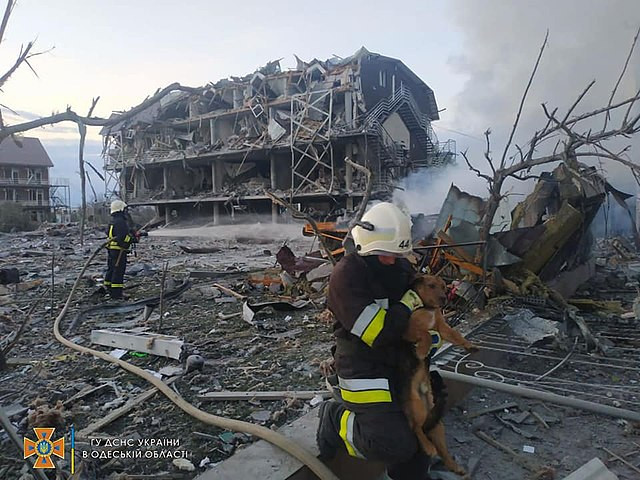At least 25 people were killed and 40 others injured in a series of Russian airstrikes across Ukraine late Friday and early Saturday, Ukrainian officials said. The attacks came just days after the United States halted military intelligence sharing with Kyiv, marking a significant shift in U.S. policy toward the conflict.
The deadliest strike occurred in Dobropillya, in Ukraine's eastern Donetsk region, where two Russian ballistic missiles hit eight residential apartment buildings and a shopping center. At least 11 people died in the attack, and more than 30 were injured, including five children, President Volodymyr Zelensky said in a statement on X.
Shortly after emergency responders arrived at the scene, Russia launched a second strike, deliberately targeting rescuers, according to Zelensky. "This is a vile and inhumane intimidation tactic often used by the Russians," he said.
Additional attacks in the Donetsk region killed at least nine people and wounded 13 others, local officials reported. In Bohodukhiv, a town in the northeastern Kharkiv region, three people were killed and seven others injured in a separate drone strike. Another Russian drone attack targeted civilian and energy infrastructure in Odesa, bringing the total death toll from the overnight assaults to 25.
"Such strikes show that Russia's objectives have not changed," Zelensky said. "It is crucial to continue to do our best to protect lives, strengthen our air defenses, and increase sanctions against Russia." He urged further financial and diplomatic pressure on Moscow, stating, "Everything that helps Putin finance the war must collapse."
The attacks came just one day after the Biden administration ceased intelligence sharing with Ukraine, including access to satellite surveillance imagery. The National Geospatial-Intelligence Agency confirmed the suspension, stating, "In accordance with the [Trump] administration's directive on support to Ukraine, NGA has temporarily suspended access to the Global Enhanced GEOINT Delivery system."
While Ukraine continues to use Starlink satellite communications, the loss of U.S. intelligence support is expected to impact Kyiv's ability to track Russian troop movements and plan counteroffensives.
Polish President Donald Tusk condemned the airstrikes and indirectly criticized the changing Western stance on Ukraine. "This is what happens when someone appeases barbarians," he said in a statement on X. "More bombs, more aggression, more victims. Another tragic night in Ukraine."
The suspension of U.S. military assistance follows a tense exchange last week between President Donald Trump and Zelensky at the White House, where Trump reportedly scolded the Ukrainian leader for being "disrespectful" toward U.S. aid efforts. Trump later stated that he found it "more difficult, frankly, to deal with Ukraine" than with Russia.
In a separate statement on Friday, Trump suggested that he was considering large-scale sanctions and tariffs on Russia until a ceasefire agreement was reached. However, his administration's pause in military assistance has fueled concerns in Europe that the U.S. may not provide the same level of security support as it has in the past.
The European Union, in response, has moved to bolster its own defense spending and renew its commitment to Ukraine. EU leaders met in Brussels on Thursday to discuss plans for additional military funding.
Meanwhile, diplomatic efforts to broker a ceasefire are ongoing. Trump's special envoy, Steve Witkoff, is scheduled to meet with Ukrainian negotiators in Saudi Arabia next week to explore potential peace talks.
Since launching its full-scale invasion of Ukraine in February 2022, Russia has seized control of approximately 20% of Ukrainian territory, with the frontlines remaining highly contested.






